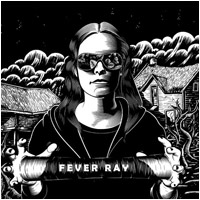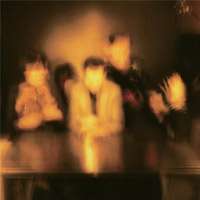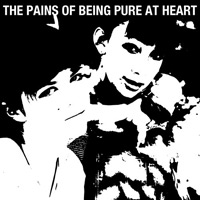Top 10 Albums

Lemons
Goner
Like last year’s self-titled album, Lemons favors a lean and mean squall of just a couple guitar tracks, drums and perhaps some bass. The MO manifests itself in powerful bursts of flurry and melody, lovingly crunching nerves and skull. “Can’t Talk” is suicidal and lovelorn in theme, but whiplashing in intent, all of two chords (and a cloud of dust), while “Cents” is white boy blues as sung from the deadzone. This is a record of economy, with the whole album over and done in less than half an hour, but that’s all the time Segall needs to prove his mettle.

Through the Magical Door
Florida’s Dying
After a few excellent singles (last year’s “Chewing Gum,” in particular), the Electric Bunnies treated us with their full-length debut this year. The album takes the garage pop for which they’ve become known and twists it inside out. As such, Though the Magical Door, as the name implies, is an aesthetic imersion, where each song reflects something of the greater whole while taking us along the path to wonderland.

Hospice
Frenchkiss
After several records made on his lonesome, Peter Silberman recruited drummer Michael Lerner and multi-instrumentalist Darby Cicci to help him realize Hospice. Self-released in March before being picked up by Frenchkiss in August, the album still remains within the almost claustrophobically close quarters of Silberman’s headspace. Now, however, the recondite realm in which he operates, which for Hospice focuses on the central theme of a damaging relationship between a hospice worker and her patient, has been magnified. As such, little sonic gestures are lent grandeur and Silberman’s toothsome, folky pop is made majestic, coalescing into an album of unparalleled nuance that transcends even its ambitious conceptual premise.

Fever Ray
Mute
On her solo debut as Fever Ray, the Knife’s Karin Dreijer creates an insular word of self-discovery. Her ever so slightly affected voice traipses over exotic icy soundscapes, leaving small revelations in its wake. It’s this balance of personal epiphany and Fever Ray’s frosted-pop countenance that gives the record its brilliance. As such, when she sings “I put my soul in what I do,” amongst the electronic nettles of “When I Grow Up,” she leaves no reason to doubt her.

The Spoils
Sacred Bones
The songs on the first full-length from Zola Jesus (a.k.a. Nika Roza Danilova) seem to exist outside of locale or context, a whole unto itself where each note, noise and utterance does it part to erect a sonic sphere. Danilova was trained as an opera singer, and it’s her voice that gives the record its grounding, even as it soars to recommend that you “let the devil take you.” Though more mechanical and steely in tone, one can hear echoes of the Banshees (The Scream, in particular), as Zola Jesus shares a similar sense of gothic drama to Siouxsie Sioux. In this cloistered terrain, however, the machinery’s austere output only helps to elucidate Danilova’s caterwaul, a light in the album’s welcoming darkness.

Primary Colours
XL
I may have been in the minority in digging the Horrors’ debut, Strange House, as most took their impish vamping of Birthday Party–like aesthetics as posturing. Invalidating that point of view, the British upstarts released Primary Colours, an album textured with moody atmospherics and effects-laden Kraut grooves. Caught in a self-styled vortex aswirl in angel-dusted guitars and caterwauled fatalism, cuts like “Three Decades,” “Do You Remember“ and the eight-minute “Sea Within a Sea” showed that there was much more to this band than just soot and grease paint.

Jewellery
Matador
Jewellery, the debut from Mica Levi and her Shapes, Raisa Kahn (keys) and Marc Pell (drums), lurches and lays back in all the right places. Levi seems equally comfortable frantically reconfiguring a groove as slowly picking apart a pop song. At its heart, what the band does is very basic, a sort of post-modern skiffle that’s not above falling in on itself. With more rhythm than melody emitted from Levi’s beat-up six-string, Kahn and Pell provide a semblance of form, a buzzing swirl of synth and knocked beats encircling Mica’s dodgy vocals on life, music and sex (but not necessarily in that order, of course).

Born Again Revisited
Matador
While the world took notice of Columbus’ trio-that-could with their Matador debut, Rip It Off, it’s with their second record for the label that Times New Viking has brought to fruition the promise of their prior releases. Here, the band veers between between franatic punkisms, pop skrees, and moody experiments. Like their best work, cuts such as “No Time, No Hope” and “City On Drugs” combine a gleeful fatalism with hooks too sharp to resist. Morrissey once sang, “We hate it when our frieds become successful,” but in this case, he’s dead wrong.

The Pains of Being Pure at Heart
Slumberland
Borrowing feedback and innocence from the best of sources (The Jesus and Mary Chain, the Pastels, etc.), the Pains of Being Pure at Heart crafted a sound on their full-length debut worthy of such heritage. But having so fully digested their record collections, the band churns out a sound that’s at once reverential and, well, purely their own. The barbed melodies of songs like “Come Saturday” and “ Everything With You” are as visceral as they are lovelorn, a powerful equation of equal parts whimsy and fury.

Under and Under
In the Red
As with much of Mike Sniper’s work as Blank Dogs, Under and Under seems to occupy its own aesthetic world, a darkened place secure from rogue artifice or faulty trend. His effects-laden vocals, which while seeming disembodied, are too closely fused to the music’s moody tones to be truly disaffected. The album’s chord progressions and sparse machinated beats tie him to post-punk minimalism, but he cloaks his reference points in a shroud of lo-fi pop noise. There’s no mistaking the deftness of his slight-of-hand on “The New Things” and would-be single “No Compass,” where he bends his haunted dreamscapes towards warped gold, multiple melody lines caught up in the swirl. Under and Under is like a musical black hole, one whose pull is too strong to overcome.
Lower Heaven, Ashes (self-released)
As much as the mere mention of an autoharp can conjure memories of singing “Kumbaya” in elementary school, LA’s Lower Heaven meld their use of the instrument into the shimmery sound they create more effectively than you can imagine. Taking their name from a lyric off of Echo and the Bunnmen’s Porcupine, the band creates an appropriately darkened din of post-punk atmospherics. Ashes is a remarkable album, which, I’m hesitant to admit, is better than anything the Bunnymen have done this decade.
Bad Veins, Bad Veins (Dangerbird)
This Cincinnati duo creates a sound that transcends the sum of its part. The moody brew of its self-titled debut is a cascade of sumptuous sounds that stem from both mechanical ingenuity and an emotional wellspring, the juxtapositon coalescing into something bigger than even they probably imagined.
The Postmarks, Memoirs at the End of the World (Unfiltered)
With hints of both the Sundays and Morricone, the Postmarks have created a record of timeless pop. The breathy coo of Tim Yehezkely (a female Tim) is the kind of voice that gives chills, contrasting nicely with the warm hues the band creates.
